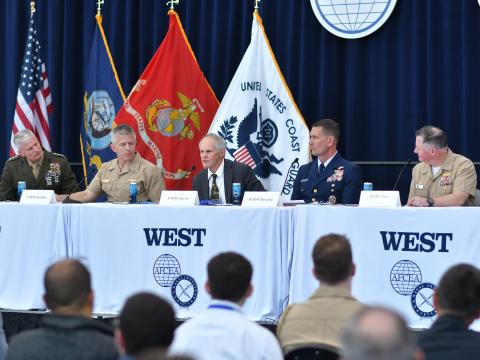In ChatGPT We Trust, or at Least Research
Generative artificial intelligence, like OpenAI’s ChatGPT or Google’s Bard, will be leveraged for national security and the calls for a moratorium on its development should be ignored.
“I’m not scared of generative [artificial intelligence],” said Lt. Gen. Robert Skinner, director of the Defense Information Systems Agency (DISA) and commander of the Joint Force Headquarters, Department of Defense Information Network (JFHQ-DODIN).
When answering about the calls to stop developing this technology, Gen. Skinner looked at how it would affect the technology race with adversarial actors. “I think it would be a mistake to pause the research that we’re doing because our adversaries will not be,” he said.
Gen. Skinner called on industry to help DISA leverage new uses for this technology.
“It very much feels like the early days of the internet, but in the 90s, when everyone was trying to figure out what the impact was, and there you saw about a decade that it took to really be deeply impactful,” said Stephen Wallace, emerging technologies director at DISA.
“We see it as a force enabler or a force multiplier for our team,” Wallace added. He also explained how the agency is interested in using this technology for data labeling where zero trust initiatives need to be fed with information that demands repetitive, long and painstaking work to label it.
Gen. Skinner brushed off how this technology empowers those without technical training to produce malicious code that could be potentially harmful to the country’s security.
“I don’t see this as really helping the adversaries, but it can help those who are novices, as due to this, they’ll be able to write malware and other capabilities that we need to make sure that we are immune to,” Gen. Skinner told journalists at a media event on the sidelines of AFCEA’s Technet Cyber conference in Baltimore on Wednesday.

I don’t see generative [artificial intelligence] as really helping the adversaries, but it can help those who are novices
The DISA experts panel also addressed Thunderdome, the agency’s zero trust security implementation. “We are in some final stages of prototype activity to help us with cost estimation, but we also have some contracting activity that’s going on behind the scenes as well,” said Brian Hermann, Cyber Security and Analytics director at DISA.
The agency addressed the joint warfighting cloud capability (JWCC), a Department of Defense initiative implemented by DISA to connect government, military, allies and partners to a safe environment for information sharing. A pilot is being deployed in Hawaii as a first step toward reaching the Indo-Pacific, according to Sharon Woods, director of the Hosting and Compute Center at DISA.
Gen. Skinner closed the event explaining that the Russian invasion of Ukraine is an opportunity to share knowledge and insights and added that interoperability with allies should be centered around sharing information. Caroline Bean, who leads the agency's Joint Enterprise Services Directorate, stressed the importance of exercises with other armed services to advance cooperation.



Comments